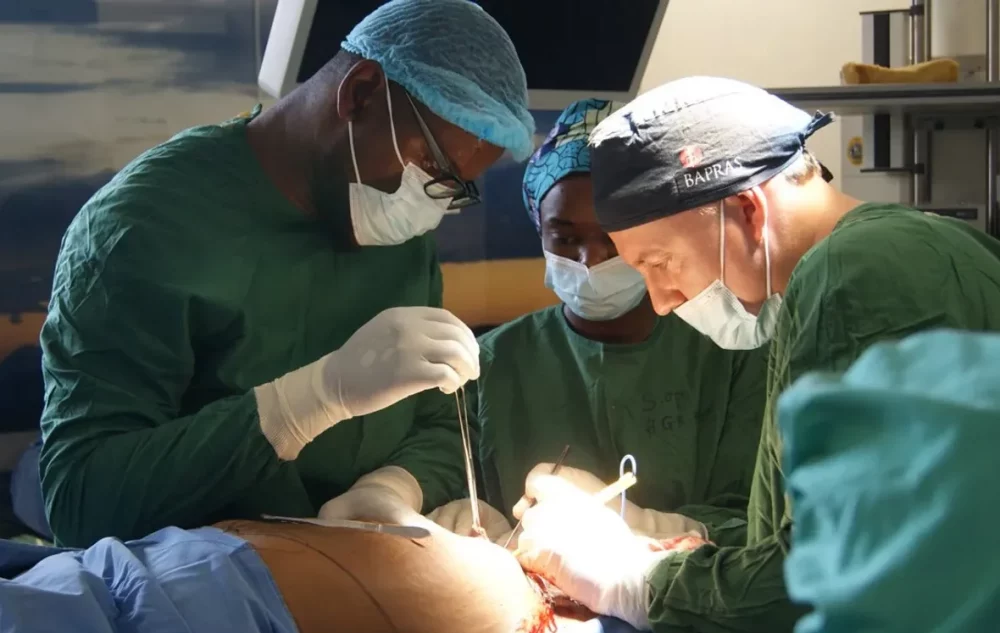Plastic Surgeon leads trip to pass on vital skills to help victims of sexual violence

A professor from Swansea university is taking the lead in global action to tackle sexual violence in conflict, following a unique mission to the Democratic Republic of Congo.
Led by Professor Iain Whitaker, consultant plastic surgeon from Swansea University Medical School, a specialist team travelled to the renowned Panzi Hospital to launch an initiative to support the management of female victims of sexual violence in conflict.
Transforming lives
The trip came about following a request from HRH the Duchess of Edinburgh, who visited the University in 2022 to officially open the Scar Free Foundation and Health & Care Research Wales Programme of Reconstructive Surgery & Regenerative Medicine (ReconRegen).
In her role as patron of the Scar Free Foundation, the Duchess also travelled to the Panzi Hospital later that year to raise awareness of the urgent need to tackle sexual violence in conflict. Under the guidance of its medical director Dr Denis Mukwege, the Panzi has transformed the lives of more than 80,000 victims but in the most extreme cases, the injuries suffered are too severe for the Panzi’s surgeons to treat.
She wanted Professor Whitaker to meet Nobel Peace Prize-winner Dr Mukwege to see if contemporary plastic and reconstructive techniques and innovative research could support his work.
Approach
Recognising that successful treatment of these most difficult cases would require a novel combination of advanced plastic & reconstructive and gynaecological surgery, Professor Whitaker approached Sohier Elneil, professor of urogynaecology at UCL, to join the team.
During their time in DRC, both Professor Whitaker and Professor Elneil operated on women with long-standing functional problems affecting the urinary systems and trunk. The procedures were observed by the Panzi’s surgeons, who were eager to learn new skills.
Professor Whitaker said: “It was a privilege to have been invited to travel more than 6,000kms to the DRC to experience the incredible work Dr Mukwege is doing, offering expert medical care and hope to victims of conflict-related sexual violence (CRSV).
“The women I met there inspired me with their strength, personality, class and resilience and it made me, and the rest of the delegation determined to support Dr Mukwege and the Panzi team to enhance the care of this patient group.”
High risk
As much of the DRC is classified as high risk by the Foreign, Commonwealth and Development Office, direct travel from the UK was not possible. It took the team three days – with two flights and a road crossing from Rwanda – to reach the hospital.
They brought with them 20 3D printed high fidelity silicone prototype surgical training models, developed in collaboration with Associate Professor Hari Arora at the University’s Biomedical Engineering Simulation & Testing Lab (BEST Lab). These are now being evaluated by surgeons at hospital and their valuable feedback will help develop future models.
The importance of the initiative was also recognised by the UK Ambassador to the DRC, Alyson King, who made the trip to the Panzi Hospital to find out more about Dr Mukwege’s work and discuss future projects with the Swansea delegation. Describing her visit as inspiring, she added: “I pay particular tribute to Professors Whitaker and Elneil and their colleagues for their work. Sexual violence is one of the most horrific consequences of this conflict, but this initiative brings hope to the victims.”
This initial trip was so successful that plans are already being made for a return visit next year, along with a meeting to coincide with the 15th anniversary of the UN Initiative to prevent CRSV this month.
The initiative’s long-term aims are to improve the multidisciplinary management of women suffering from conflict-related sexual violence injuries and to strengthen the Panzi’s training and research capabilities to develop methods that can be on patients all over the world.
Vital work
Scar Free Foundation Chief Executive Lt Gen (retd) Richard Nugee said: “This work, looking at how scarring can be avoided and lives improved, is vital in building the capacity of skilled local surgeons to restore the health and dignity of survivors who have suffered conflict-related sexual violence.
“As a veteran with a strong interest in supporting all survivors of conflict – soldiers and civilians – I believe strongly that this cross-cultural collaboration will have a positive impact – not only in DRC, but in our own research labs in Swansea, where the 3D printing of human tissue is groundbreaking.”
In addition to Professor Whitaker, the delegation included the Duchess’s private secretary Alexander Stonor, Professor Elneil, ReconRegen programme manager Octavian Parkes and Stephen Ali, Swansea University clinical lecturer and plastic surgery registrar.
The initiative was funded by the Welsh Government’s Wales and Africa Grant Scheme and Taith Researcher Mobility Exchange Programme, with support from The Scar Free Foundation, Health & Care Research Wales, the FCOD and the Office of the Duchess of Edinburgh.
Support our Nation today
For the price of a cup of coffee a month you can help us create an independent, not-for-profit, national news service for the people of Wales, by the people of Wales.





